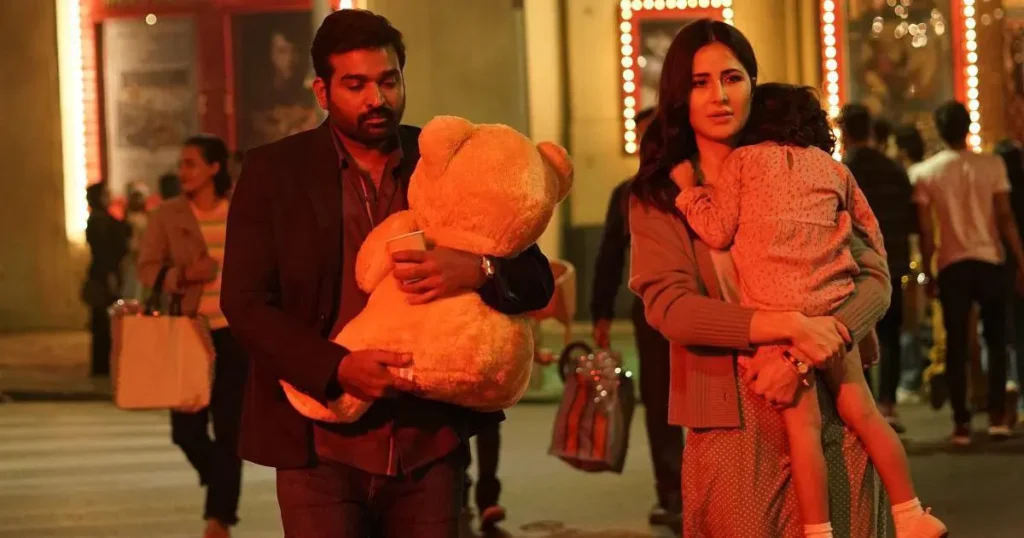Most of the first half of Merry Christmas is foreplay of the most unexpected kind. We expect noir-ish thrillers from Sriram Raghavan, but we seem to be in some kind of romance – the kind where two strangers meet at night and spend a lot of time talking and just being with each other. Imagine Before Sunrise as written by the bastard child of James Hadley Chase and Gulshan Nanda, and you may get an idea. Vijay Sethupathi plays Albert Arockiasamy, a Tamilian who has returned to his home in Bombay (not Mumbai) after several years. His friendly landlord, played by Tinnu Anand, gives him a bottle of wine that he has made, and the brand name is Yadhoom. He tells Albert that the word stands for that moment we all search for, the moment towards which all existence has been preparing you, the moment when everything just… clicks.
The deliberately paced first half of this film keeps preparing – and preparing, and preparing – us for the film’s Yadhoom Moment. The woman Albert runs into is played by Katrina Kaif, and given the Christmas setting, her name could not be more appropriate: it’s Maria. She has a young daughter, and the three of them (and later, the adults alone) spend the night going to her place, then to his, then back to hers. In these time passages, we note things about them. She is the kind of person who serves wine in a wine glass, and whiskey in a whiskey glass. At his home, though, the only glasses available seem to be the kind in which a chaiwalla may pour chai into. We are in a rickety premise: Which mother would invite a strange man home? And spend so much time with him? But because it’s Sriram Raghavan, we say yes to the long fuse. We give the premise a long rope. The film’s rhythms are wonderfully elegant. The leads are fine on their own: Vijay Sethupathi has made laidback-ness an art form, and Katrina even gets to emote in an extreme close-up. But together they lack the chemistry that could have taken this stretch into a seriously swoony zone.

This is a film that’s all about structure, but I wish Sriram had played up the romanticism between the characters and gone for all-out melodrama (especially given where the story is headed). Many noir films and thrillers, after all, do use a lot of melodrama. But at least on paper, the most interesting aspect of these early portions is (a) Sriram Raghavan tackling a kinda-sorta romance (there is even a kinda-sorta kiss), and (b) our expectation that there must be a solid reason for this pace, for this relative “eventlessness”. Why, for instance, do we spend so much time watching Albert look around Maria’s living room, examining every inch of it, and even pouring himself a second drink while waiting for her to put her daughter (who’s already asleep) in bed – an action that should not take more than five minutes? (There is an answer. It comes in the second half.) So far, so interesting – but where Merry Christmas enters a point of diminishing returns is when Albert talks about his ex. He tells us (and Maria) the whole story, and then, we cut to the past and see the same thing unfold. I thought the visuals would contradict the words – otherwise, why show something that’s already been told? But no. And thereon, the film becomes increasingly less involving.
There is a ton of detail: 100-rupee notes in a copy of the Holy Bible, a teddy bear, origami swans, RD Burman’s ‘Pyar ke mod pe’ from Parinda and ‘Jab andhera hota hai’ from Raja Rani, goldfish and the question whether fish can remember things, a merry nod to Ernst Lubitsch, and even a freaking chainsaw. But this cannot compensate for the fact that the long foreplay does not result in a toe-curling climax. Merry Christmas is essentially an audacious experiment. Sriram is basically asking if you can have a thriller without the things that usually make up a thriller: the nail-biting tension, the pulse-quickening background score, twists and turns, the eureka moments where you slap your forehead and say you never saw that coming, and so forth. What if we replay the same set of events again and confuse the audience even more, at a time they are expecting at least some clarity! What if there is just one major twist, and we keep it away from the audience as far as possible! (It involves an apartment, and I did not find it convincing, even in a pulp-fiction kind of way.) All valid intentions.
But at some point, I got the feeling the narrative was being stretched just to figure out the breaking point – the Yadhoom Moment! – rather than to give us what we came in for. And the emotional (perhaps even sentimental) ending does not fit well in the Sriram Raghavan universe. Or at least, it has not been properly built up to. Merry Christmas is easier to admire than enjoy, and at least for me, it’s an intriguing minor work from a major filmmaker.



